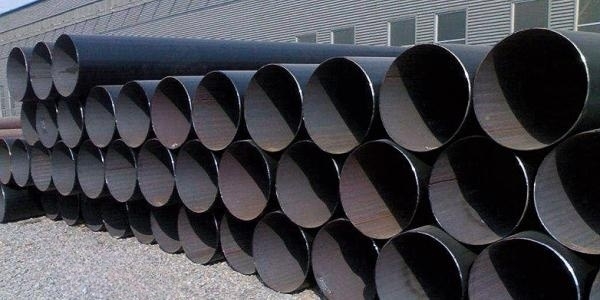Packing and delivery of longitudinal submerged arc welding pipes are crucial steps to ensure that the pipes reach their destination in good condition and are ready for installation. Here are some key packing and delivery cautions for LSAW pipes.

Packing Cautions:
- Protection Against Corrosion: LSAW pipes are often made of steel, which is susceptible to corrosion. Proper protective measures, such as applying anti-corrosion coatings, wrapping pipes in plastic or other moisture-resistant material, and using corrosion-inhibiting agents, should be taken to prevent rust during transit and storage.
- Bundling: Pipes can be bundled together for ease of handling and transport. However, proper spacing and padding materials should be used to prevent friction and damage between pipes within the bundle.
- End Protection: The pipe ends are particularly vulnerable to damage during handling and transport. End caps, plugs, or protectors should be securely attached to prevent dirt, debris, and moisture from entering the pipes.
- Securing Loose Parts: Any loose parts, such as bolts, nuts, or flanges, should be properly secured and protected to prevent them from scratching or denting the pipes.
- Padding and Cushioning: Adequate padding and cushioning materials should be used in the packaging to minimize the risk of impact-related damage during transit. This is especially important for preventing dents and bends.
- Labeling and Documentation: Each bundle of LSAW pipes should be clearly labeled with important information, including pipe specifications, quantity, size, material grade, and destination. This helps ensure accurate handling and delivery.
Delivery Cautions:
- Handling Equipment: Ensure that appropriate handling equipment, such as cranes, forklifts, and slings, are used to lift and move the pipes. Care should be taken to avoid dropping or mishandling the pipes, which can cause dents, bends, or other damage.
- Secure Loading: When loading the pipes onto trucks or containers, ensure that they are properly secured and blocked to prevent movement during transportation. This helps prevent potential collisions and shifts that could cause damage.
- Weather Conditions: Weather conditions can impact the quality of the pipes during transit. Pipes should be protected from rain, snow, extreme temperatures, and direct sunlight to prevent corrosion and other forms of damage.
- Unloading Precautions: When unloading the pipes at the destination, follow proper unloading procedures to prevent sudden impacts and damage. Pipes should be carefully lowered and placed onto appropriate supports.
- Inspection Upon Arrival: Upon delivery, inspect the pipes for any visible damage, such as dents, scratches, or corrosion. Proper documentation of any issues will be helpful for any potential claims or follow-up with the supplier.
- Storage Conditions: If the pipes are not immediately being installed, they should be stored in a dry and well-ventilated area, preferably on supports to keep them off the ground. Protective measures against environmental factors should still be in place during storage.
By following these cautions and guidelines for packing and delivery, you can help ensure that LSAW pipes arrive at their destination in optimal condition, ready for their intended use.

 English
English Español
Español




 Tel : +86-18565811709
Tel : +86-18565811709 Email :
Email : 

 News
News




